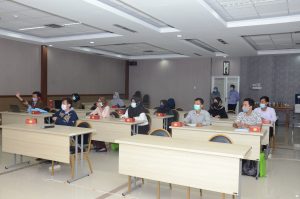Charles Sturt University and IFRDMD/SEAFDEC have organized a Virtual Training of Research Assistant
Maintaining migration pathways of fish is paramount important to protect fish from extinction. Fish need to migrate for accessing spawning, feeding, or nursery ground. River fragmentation has disrupted fish migration and prevents fish from completing the life cycle, and in the end, it can reduce fish recruitment in the river system. Barriers to fish migration can be natural or artificial. The development of water infrastructures such as dams, weirs, tidal gates, barrages, and bridges can block fish migration routes. By 2019, the Indonesian government (Ministry of Public Work and Housing) stated that 3,530 weirs and dams have been built across the nation and will continue to be expanded in the next five years up to 65 new weirs and dams.
 Professor Lee Baumgartner, a fish ecologist from Charles Sturt University, predicted that only less than 60% of global rivers are free-flowing. Nearly 17 million weirs and dams have been constructed worldwide and have significantly impacted fish decline. Fishway or fish passage construction is needed to mitigate the side effects of barriers development and provide ways for fish migration.
Professor Lee Baumgartner, a fish ecologist from Charles Sturt University, predicted that only less than 60% of global rivers are free-flowing. Nearly 17 million weirs and dams have been constructed worldwide and have significantly impacted fish decline. Fishway or fish passage construction is needed to mitigate the side effects of barriers development and provide ways for fish migration.
The Perjaya Weir located in Perjaya Village, OKU Timur Regency in South Sumatra Province is irrigation infrastructures to support the growth of agriculture production in South Sumatra and Lampung. This weir has been equipped by a fishway construction. However, the fishway was installed without adequate study of local fishers’ inhabit. Therefore, an urgent assessment is needed to test the operational and how the existing barriers affect fish biodiversity decline and alter local people’s livelihoods.
To support the effort for maintaining riverine fish biodiversity, IFRDMD/SEAFDEC, in collaboration with Charles Sturt University, organized a virtual training for research assistant. This workshop aimed to train the participants to conduct social-economy surveys and understand the human ethics principle to conduct research in humans.
 The workshop was undertaken three days from 22nd to 24th February 2021 in the Ondara room, and it was conducted virtually. The opening remarks was conveyed by Dr. Arif Wibowo as the Chief of IFRDMD/SEAFDEC and Head of RIIFFE (BRPPUPP). Dr. Jennifer Bond and Mr. Dwi Atminarso from Charles Sturt University collaborated to deliver the main training materials, including an introduction of research project, human ethics research, social research survey, and practice interview. At this moment, Mr. Dwi Atminarso is undertaking a doctoral degree in Australia sponsored by Australia Awards Scholarship. Other researchers also contributed to deliver the training materials: Ms. Dian Pamularsih Anggraeni shared about Work Ethics and Professional Attitude, Mr. Yoga Candra Ditya and Ms. Nana Dahlia introduced Communication Skills and Research Team Coordination, and Mr. Habibie delivered materials about Reporting Expenses after The Survey.
The workshop was undertaken three days from 22nd to 24th February 2021 in the Ondara room, and it was conducted virtually. The opening remarks was conveyed by Dr. Arif Wibowo as the Chief of IFRDMD/SEAFDEC and Head of RIIFFE (BRPPUPP). Dr. Jennifer Bond and Mr. Dwi Atminarso from Charles Sturt University collaborated to deliver the main training materials, including an introduction of research project, human ethics research, social research survey, and practice interview. At this moment, Mr. Dwi Atminarso is undertaking a doctoral degree in Australia sponsored by Australia Awards Scholarship. Other researchers also contributed to deliver the training materials: Ms. Dian Pamularsih Anggraeni shared about Work Ethics and Professional Attitude, Mr. Yoga Candra Ditya and Ms. Nana Dahlia introduced Communication Skills and Research Team Coordination, and Mr. Habibie delivered materials about Reporting Expenses after The Survey.
During the interview practice session, the participants were taught how to conduct interviews, respect respondents’ autonomy, and record data properly in the form.
Australian Water Partnership (AWP) and Australian Centre for International Agricultural Research (ACIAR) funded this workshop and objected to provide understanding to 8 workshop participants to conduct a social survey in the field. Those selected participants are fresh graduates from University and year 3 or 4 undergraduate students.
The outcomes of the workshop are understanding ethics in human research to ensure the respondent’s protection, understanding the questionnaire questions, conducting a social survey, and practicing mock interviews.
Deputy Chief IFRDMD/SEAFDEC, Mr. Toshiya Suzuki, congratulated all selected participants and conveyed closing remarks.
